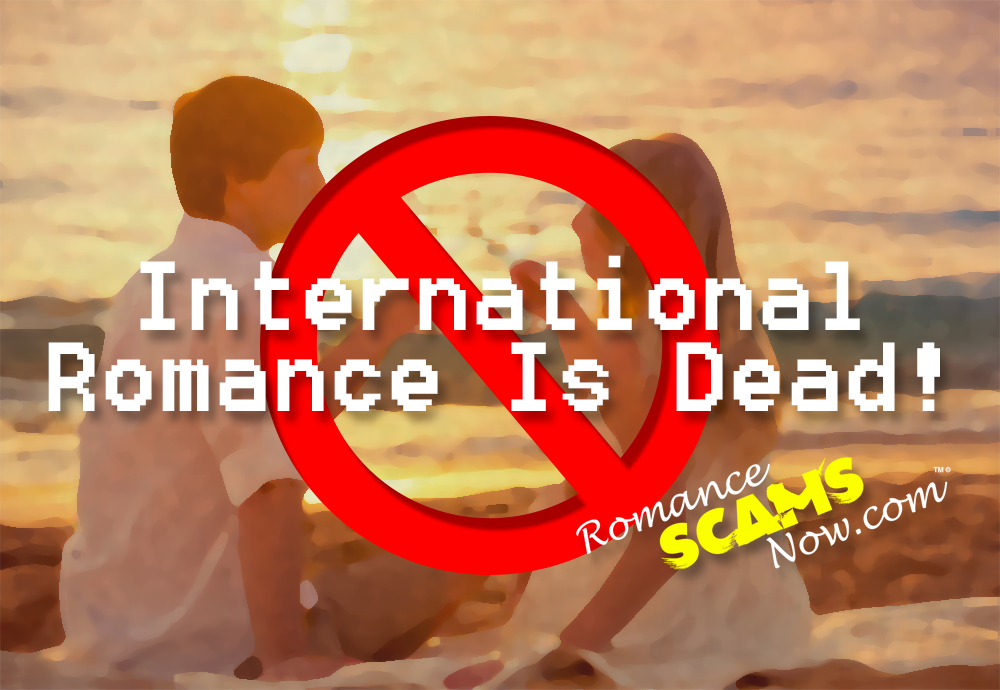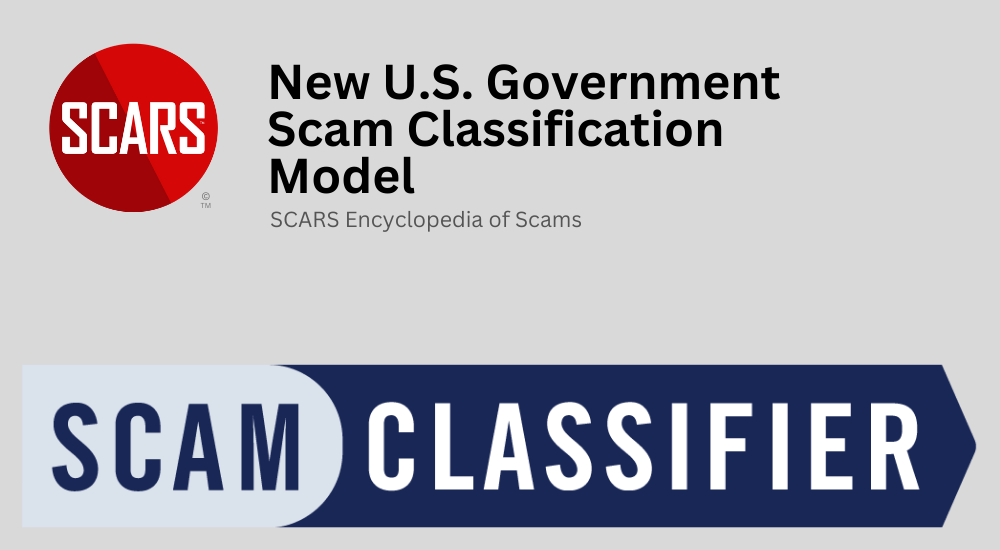
SCARS Institute’s Encyclopedia of Scams™ Published Continuously for 25 Years

In 2017 International Relationships Are Dead!
One of the amazing things about the Internet was how it allowed us to connect with amazing people around the world. This was one of the blessings of online dating also, and in fact Facebook as well. You could connect and make friends the world over.
Now fast forward to 2017 and the Internet is a dangerous place filled with fake people, haters, stalkers, pervs, terrorists, drug dealers, human traffickers, and of course scammers.
We all have effectively destroyed the environment that offered so much promise.
How did this happen?
It started with an attitude. A left leaning view that everyone is wonderful and that we can all live together in this globalized world in peace and harmony.
This was simple insanity.
The world is full of scary people – criminals, terrorists, human traffickers, slavers, scammers and much worse.
Internet social media providers such as Facebook, MySpace, Twitter, and others simply did not care about your safety. The believed that the more profiles (members) they had the better it was – this allowed them to display more ads and make more money. The bigger the better it was for their valuation.
The only exception was LinkedIn who have always done a good job of policing their space.
It really started with MySpace when the world discovered that MySpace was full of children (as young as 3 years old) having profiles on MySpace. What were those parents thinking? Was it any surprise that Pedophiles followed? The U.S. FTC went after them in a big way, imposed sanctions against them requiring that everything be reviewed and screened. Our own parent company helped MySpace resolve many of its problems by using our screening services when they got in trouble. This lead to the enactment of the COPPA law (Children’s Online Privacy & Protection Act) in the U.S. and similar laws elsewhere to protect Children online: https://www.ftc.gov/sites/default/files/documents/reports/implementing-childrens-online-privacy-protection-act-federal-trade-commission-report-congress/07coppa_report_to_congress.pdf
In fact, MySpace is under probabation (monitoring) for 20 years because of all this: https://www.techdirt.com/articles/20120508/17433418836/ftc-to-monitor-myspace-andor-empty-space-20-years.shtml
Unfortunately, the situation is more regulated now, but actually less safe today than it was all those years ago.
Today the world governments have mostly turned a blind eye towards scammers and allowed them to grow astronomically large. Some estimate that 30% of all Facebook Profiles are fake. Same for Twitter, same for Google+ This is an industry wide failure.
The notion that the community of users will police itself and report every fake is great if Facebook actually listens, but they don’t. They don’t because they have not trained their employees well enough to recognize fakes when they see them. They side with the fake or the scammer due to political correctness and apathy. In fact, if you report “too many” fakes you will be punished on Facebook as being a cyberbully.
The result is that if you are on Facebook you are substantially at risk. If you are on online dating, you are walking on the edge of disaster.
So what is the answer?
Ironically, the answer is very simple and it would take less than 90 days for all of social media to implement.
This is known as the “SCARS Plan”:
- With every profile, every post, every note, photo, etc. Use the log in IP Address of the person connected to display the COUNTRY and CITY a person is in when they post EVERY TIME. Scammers sometimes use proxy servers, but this will still show the inconsistency in their locations.
- Do not allow a new profile to specify a location, extract it from the IP address automatically, and make it permanently displayed publicly in the profile. Do not allow it to be changed more than once a year. This means we will know the REAL location of the person in every profile.
- Every profile must provide proof of identity within 180 days from the date of the creation of the profile. And when they are sent, validate the profile – or display the profile as “Identity Not Confirmed”.
- Make it much easier to verify the identity of people and businesses in social media. Many people use different names (nicknames) for their profiles, and companies use brands and DBAs all the time, Facebook and others must make it easier when verifying a page (regardless of the size of the business), same for profiles. This will not work for all countries, but where it does it will be a safer community and allow users to make decisions based upon it.
- Use facial/image recognition to flag profiles that have profile photos used on other profiles – to help eliminate flakes and duplicate profiles. Use algorithms that periodically cycle through all profiles looking for this duplication. On all new profile photo uploads do a duplicate check.
- Provide a much easier way to report scams and scammers online. Then carefully examine the profile for communications that show the scam behavior. This can be done using algorithms as the first line, then escalation if it fails. This will also help eliminate spam.
- Work with the two largest scammer databases (SCARS & Scamalytics) to filter against profiles for scammer identification in all new and existing social media profiles.
If these things were done over 97% of fakes would disappear in a matter of 3 to 4 months. It would also inhibit the creation of new fake profiles which number in the tens of millions each year.
Unfortunately, the social media industry is not embracing these types of changes and continue to allow anyone to create profiles, relying on us to report them and for us to hope they will listen to us.
But in the end, you simply cannot trust anyone online unless you physically know them, or have known them online over a very extended period of time. International friends are a fiction that few of us can afford any more.
This is tragic in that this was the real promise of social media, but the reality has become a nightmare due to the failure of the social media companies to employ proper common sense safeguards.
Perhaps you can share this post by email with Facebook and maybe something will happen?
Encourage them to talk with SCARS (Society of Citizens Against Romance Scams) at the upcoming iDate event in January and implement the SCARS Plan now!
Send to Jamil Walker, Corporate Communications Manager, Facebook, 650-785-5818; jamilw@fb.com AND Andrea Saul, Policy Communications Manager, Facebook 650-822-4089; saul@fb.com Who knows maybe they will listen if they get enough emails? You can just copy and past this post for them.
Tell Facebook what YOU think about your safety in Facebook, and that the Society of Citizens Against Romance Scams (www.AgainstScams.org) has a plan to keep you safe!
Thank you for reading this!
Cheers,
RSN Team
-/ 30 /-
What do you think about this?
Please share your thoughts in a comment below!
Table of Contents
- We all have effectively destroyed the environment that offered so much promise.
- This was simple insanity.
- Unfortunately, the situation is more regulated now, but actually less safe today than it was all those years ago.
- So what is the answer?
- This is known as the “SCARS Plan”:
- Unfortunately, the social media industry is not embracing these types of changes and continue to allow anyone to create profiles, relying on us to report them and for us to hope they will listen to us.
LEAVE A COMMENT?
Thank you for your comment. You may receive an email to follow up. We never share your data with marketers.
Recent Comments
On Other Articles
- on Finally Tax Relief for American Scam Victims is on the Horizon – 2026: “I just did my taxes for 2025 my tax account said so far for romances scam we cd not take…” Feb 25, 19:50
- on Reporting Scams & Interacting With The Police – A Scam Victim’s Checklist [VIDEO]: “Yes, this is a scam. For your own sanity, just block them completely.” Feb 25, 15:37
- on Danielle Delaunay/Danielle Genevieve – Stolen Identity/Stolen Photos – Impersonation Victim UPDATED 2024: “She goes by the name of Sanrda John now” Feb 25, 10:26
- on Reporting Scams & Interacting With The Police – A Scam Victim’s Checklist [VIDEO]: “So far I have not been scam out of any money because I was aware not to give the money…” Feb 25, 07:46
- on Love Bombing And How Romance Scam Victims Are Forced To Feel: “I was love bombed to the point that I would do just about anything for the scammer(s). I was told…” Feb 11, 14:24
- on Dani Daniels (Kira Lee Orsag): Another Scammer’s Favorite: “You provide a valuable service! I wish more people knew about it!” Feb 10, 15:05
- on Danielle Delaunay/Danielle Genevieve – Stolen Identity/Stolen Photos – Impersonation Victim UPDATED 2024: “We highly recommend that you simply turn away form the scam and scammers, and focus on the development of a…” Feb 4, 19:47
- on The Art Of Deception: The Fundamental Principals Of Successful Deceptions – 2024: “I experienced many of the deceptive tactics that romance scammers use. I was told various stories of hardship and why…” Feb 4, 15:27
- on Danielle Delaunay/Danielle Genevieve – Stolen Identity/Stolen Photos – Impersonation Victim UPDATED 2024: “Yes, I’m in that exact situation also. “Danielle” has seriously scammed me for 3 years now. “She” (he) doesn’t know…” Feb 4, 14:58
- on An Essay on Justice and Money Recovery – 2026: “you are so right I accidentally clicked on online justice I signed an agreement for 12k upfront but cd only…” Feb 3, 08:16
ARTICLE META
Important Information for New Scam Victims
- Please visit www.ScamVictimsSupport.org – a SCARS Website for New Scam Victims & Sextortion Victims
- Enroll in FREE SCARS Scam Survivor’s School now at www.SCARSeducation.org
- Please visit www.ScamPsychology.org – to more fully understand the psychological concepts involved in scams and scam victim recovery
If you are looking for local trauma counselors please visit counseling.AgainstScams.org or join SCARS for our counseling/therapy benefit: membership.AgainstScams.org
If you need to speak with someone now, you can dial 988 or find phone numbers for crisis hotlines all around the world here: www.opencounseling.com/suicide-hotlines
A Note About Labeling!
We often use the term ‘scam victim’ in our articles, but this is a convenience to help those searching for information in search engines like Google. It is just a convenience and has no deeper meaning. If you have come through such an experience, YOU are a Survivor! It was not your fault. You are not alone! Axios!
A Question of Trust
At the SCARS Institute, we invite you to do your own research on the topics we speak about and publish, Our team investigates the subject being discussed, especially when it comes to understanding the scam victims-survivors experience. You can do Google searches but in many cases, you will have to wade through scientific papers and studies. However, remember that biases and perspectives matter and influence the outcome. Regardless, we encourage you to explore these topics as thoroughly as you can for your own awareness.
Statement About Victim Blaming
SCARS Institute articles examine different aspects of the scam victim experience, as well as those who may have been secondary victims. This work focuses on understanding victimization through the science of victimology, including common psychological and behavioral responses. The purpose is to help victims and survivors understand why these crimes occurred, reduce shame and self-blame, strengthen recovery programs and victim opportunities, and lower the risk of future victimization.
At times, these discussions may sound uncomfortable, overwhelming, or may be mistaken for blame. They are not. Scam victims are never blamed. Our goal is to explain the mechanisms of deception and the human responses that scammers exploit, and the processes that occur after the scam ends, so victims can better understand what happened to them and why it felt convincing at the time, and what the path looks like going forward.
Articles that address the psychology, neurology, physiology, and other characteristics of scams and the victim experience recognize that all people share cognitive and emotional traits that can be manipulated under the right conditions. These characteristics are not flaws. They are normal human functions that criminals deliberately exploit. Victims typically have little awareness of these mechanisms while a scam is unfolding and a very limited ability to control them. Awareness often comes only after the harm has occurred.
By explaining these processes, these articles help victims make sense of their experiences, understand common post-scam reactions, and identify ways to protect themselves moving forward. This knowledge supports recovery by replacing confusion and self-blame with clarity, context, and self-compassion.
Additional educational material on these topics is available at ScamPsychology.org – ScamsNOW.com and other SCARS Institute websites.
Psychology Disclaimer:
All articles about psychology and the human brain on this website are for information & education only
The information provided in this article is intended for educational and self-help purposes only and should not be construed as a substitute for professional therapy or counseling.
While any self-help techniques outlined herein may be beneficial for scam victims seeking to recover from their experience and move towards recovery, it is important to consult with a qualified mental health professional before initiating any course of action. Each individual’s experience and needs are unique, and what works for one person may not be suitable for another.
Additionally, any approach may not be appropriate for individuals with certain pre-existing mental health conditions or trauma histories. It is advisable to seek guidance from a licensed therapist or counselor who can provide personalized support, guidance, and treatment tailored to your specific needs.
If you are experiencing significant distress or emotional difficulties related to a scam or other traumatic event, please consult your doctor or mental health provider for appropriate care and support.
Also read our SCARS Institute Statement about Professional Care for Scam Victims – click here to go to our ScamsNOW.com website.








![SCARS™ Special Report: Help Wanted Scams [Updated] job scams SCARS™ Special Report: Help Wanted Scams [Updated] job scams](https://romancescamsnow.com/wp-content/uploads/2020/03/job-scams.png)







Guy on facebook using name smith jackson amd johntson and other scott jackson he in mitary in africa try scam me for money
This is awful. Fear and paranoia is not the answer. Having a means and methodology to determine the authenticity of an international connection is more appropriate than isolating a nation or demographic with fear. Moderate balance NOW. I am in a true international relationship that was established over Facebook and I have spent 9 months with my partner in his home country. We communicate every day now, being that we are separated on opposite sides of the planet. We refuse the advances of every one else and live faithful to each other, though painfully separated. Our love is overcoming a great trial of a degraded planet. What say you about your love?